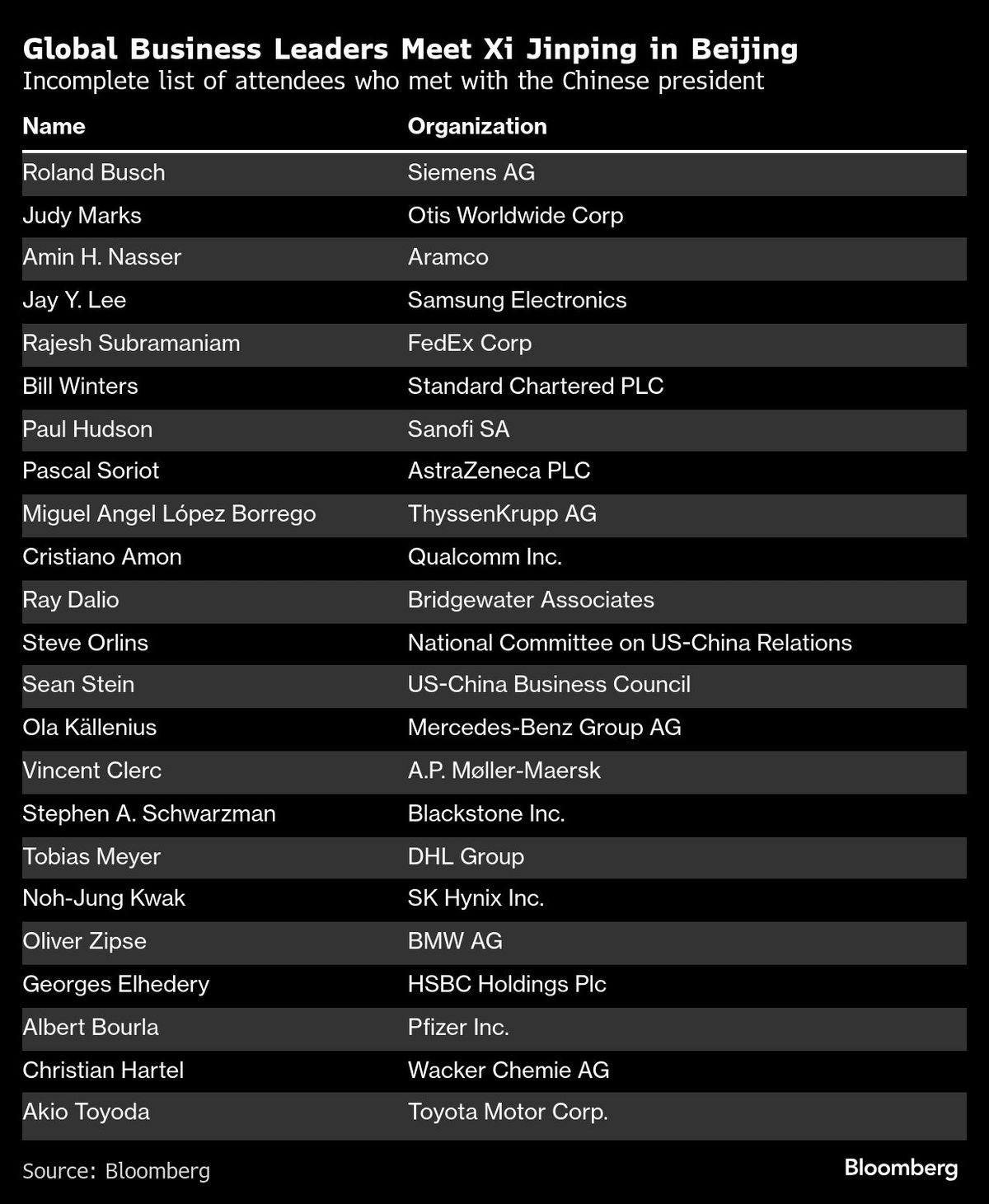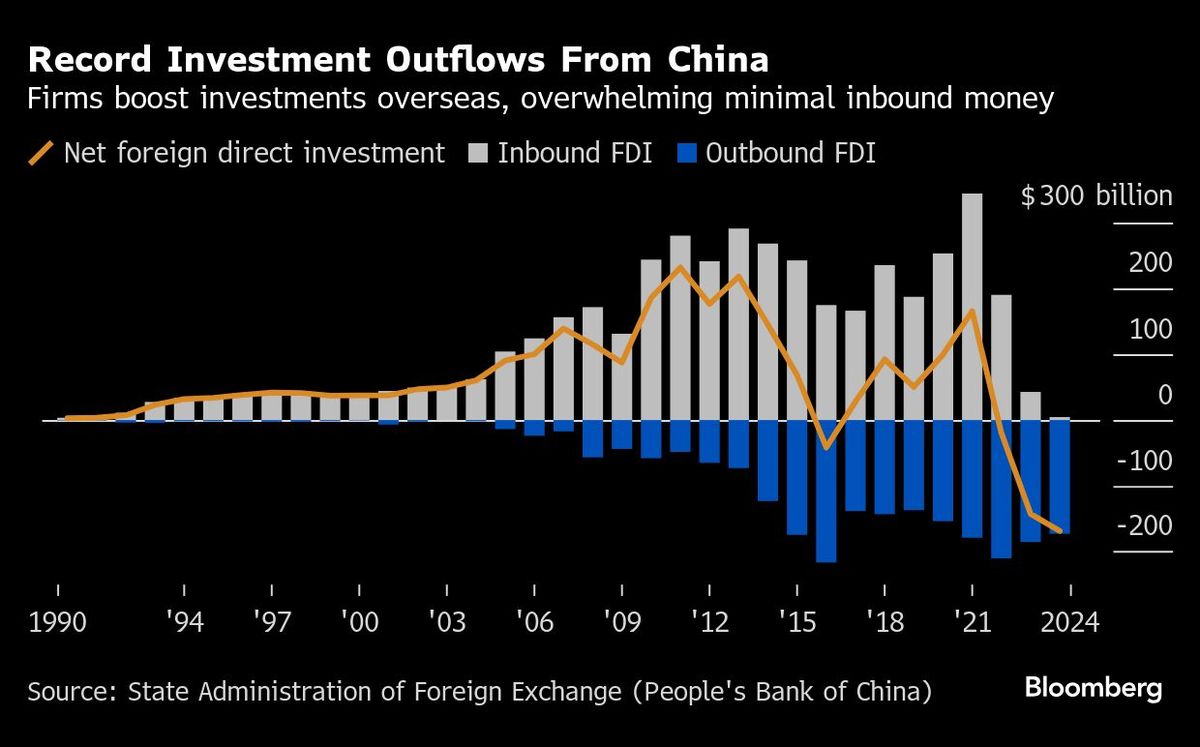
Chinese President Xi Jinping (far right) meeting with global business leaders in Beijing. 'We are providing a transparent, steady and predictable policy environment,' Xi said at the Great Hall of the People, touting the country as a 'favourite destination' for foreign investors.
(March 28): Chinese President Xi Jinping vowed to improve market access at a meeting with a group of global business leaders in Beijing, in an effort to boost investor sentiment as rising tariffs fuel uncertainty for the economy and international trade.
Xi on Friday told more than 40 leaders of companies spanning finance, manufacturing and technology that China welcomes their investment. He also acknowledged how geopolitical factors — which he called “distractions” — have affected their ability to do business with his country in recent years.
“We are providing a transparent, steady and predictable policy environment,” Xi said at the Great Hall of the People, touting the country as a “favourite destination” for foreign investors. “Embracing China is embracing opportunities.”
The number of attendees more than doubled that of last year’s event, when Xi met about 20 mostly US business figures to burnish confidence in the world’s second-largest economy. Unlike in 2024, he also invited reporters into the room where he gave the concluding remarks.
The action appears to be an attempt to project openness as the US ramps up protectionist measures against adversaries and allies alike, with a 25% tariff on auto imports and potential fresh levies on the European Union and Canada intensifying an already destabilising trade war.
The benchmark CSI 300 Index of onshore Chinese stocks pared some losses to trade 0.4% down, while the offshore yuan also trimmed its decline versus the US dollar.
In his speech, Xi said friction in China-US ties should be managed through dialogue and called on companies to work with China to uphold the global economic order, in a veiled critique of the Trump administration’s trade actions.
“Blowing out another lamp won’t make your own glow brighter, blocking another’s path and you will ultimately block your own,” Xi said, calling on the firms to help maintain stable industrial and supply chains.
The attendees represent companies from countries including the US, Europe, Japan and South Korea, and some shared views that Xi said the Chinese government will “study and consider.” Chinese officials overseeing the economy, finance, trade and national development joined the meeting, highlighting the importance Xi attached to the event.
Slowing economic expansion and mounting geopolitical tensions have hurt the appeal of investing in the Asian nation, with inbound investment tumbling last year to its lowest in over three decades.
More headwinds may come next month, when the US is set to complete a review of Beijing’s compliance with the phase-one trade deal struck during US President Donald Trump’s first term and impose reciprocal duties globally.
Chinese Premier Li Qiang on Sunday said the country is prepared for “shocks that exceed expectations” as the government targets an ambitious growth target of about 5% this year. Economists estimate that Beijing would need to unleash trillions of yuan in stimulus to hit that goal if tariffs surge.
China’s interaction with the top business figures underscores the message it’s been sending that the nation is open for business — contrasting itself with Trump’s more protectionist “America First” policies.
Beijing is also trying to cast itself as a supporter of private enterprise, illustrated by Xi’s high-profile meeting last month with entrepreneurs like Alibaba Group Holding Ltd co-founder Jack Ma.
Many global chief executive officers had travelled to China for the annual China Development Forum and the Boao Forum for Asia, which concludes on Friday. The meeting marks an upgrade from earlier years when China’s No 2 official met executives on the sidelines of the CDF, although Xi broke precedent last year to meet a group of US businesspeople.
Republican Senator Steve Daines, a member of the Foreign Relations Committee, met with several Chinese leaders including Premier Li earlier this week, in what has been seen as an initial step to set up a summit between Xi and Trump.
Several US firms have already been caught in the crossfire of deteriorating bilateral relations. Chinese authorities summoned Walmart Inc executives this month over reports it asked suppliers to bear rising costs incurred by increased US tariffs. Beijing earlier placed Calvin Klein owner PVH Corp and US gene sequencing company Illumina Inc onto a so-called blacklist of entities as US tariffs took effect.
Uploaded by Tham Yek Lee
- Xi's showdown with Li Ka-shing threatens China’s pro-business push
- Tan Kean Soon steps down as T7 Global executive deputy chairman, board says no operational impact
- Company auditor loses RM1.29m to investment scam
- Huawei posts surprise loss after aggressive tech research
- Perak emerges as Malaysia's No 1 sweet corn producer


